|
|
|
Sort Order |
|
|
|
Items / Page
|
|
|
|
|
|
|
| Srl | Item |
| 1 |
ID:
142170


|
|
|
|
|
| Summary/Abstract |
Does the Arab Street hold authoritarian leaders to account for their failures on the battlefield? Sir John Bagot Glubb, the British head of the Arab Legion, noted several years after Israel's War for Independence that it was the “Street” that pushed Arab statesmen to go to war, rather than any clear strategic rationale
|
|
|
|
|
|
|
|
|
|
|
|
|
|
|
|
| 2 |
ID:
162526


|
|
|
|
|
| Summary/Abstract |
Following the June 1967 Six-Day War, the Soviet Union and Britain invested significant efforts in rehabilitating their relations with the Arab countries, notably Egypt. While both supported the withdrawal of Israel from the Arab-occupied territories, the two countries differed over the nature of the settlement. Still, at the UN Security Council, the Soviet Union supported the British draft resolution for solving the Middle East conflict. Cold War interests and competition over influence in the Middle East, however, led the Soviets to launch a public campaign against British policy in the Middle East and prevented the two countries from joining efforts to bring about a breakthrough in the Arab–Israeli conflict.
|
|
|
|
|
|
|
|
|
|
|
|
|
|
|
|
| 3 |
ID:
190115
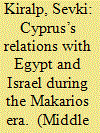

|
|
|
|
|
| Summary/Abstract |
The Makarios era (1960–1977) corresponded with two major regional disputes, with wide implications on international peace and regional politics: the Cyprus issue and the Arab–Israeli conflict. Given that these disputes are still ongoing, this study utilises diverse primary and secondary sources to analyse Cyprus’s relations with Egypt (United Arab Republic) and Israel in the Makarios period, using both political and economic perspectives. The study demonstrates that Cyprus and Egypt’s diplomatic cooperation was built on reciprocal support extended by Nasser towards the Greek Cypriots and Makarios towards Egypt in the Arab–Israeli dispute, especially in international forums such as UN debates. Although Israeli foreign policy did not threaten Cyprus directly, both Cyprus and Egypt considered Turkey a common threat. However, despite the Cypriot government’s pro-Arab stance in the Arab–Israeli conflict, Cyprus had strong relations with both Israel and Egypt concerning the economy, culture, archaeology, medicine, and telecommunications.
|
|
|
|
|
|
|
|
|
|
|
|
|
|
|
|
| 4 |
ID:
071399
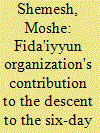

|
|
|
| 5 |
ID:
154488
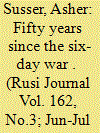

|
|
|
|
|
| Summary/Abstract |
The war of June 1967 was a watershed for the Middle East. In just six days, Israel inflicted upon the Arabs their most humiliating defeat in modern times, perhaps of all time. The great promise of revolutionary Arab nationalism, as espoused by Egypt’s charismatic president, Gamal Abdel Nasser, proved to be no more than an illusion. In this article, Asher Susser explores the lasting consequences of war, arguing that the Arabs have yet to fully recover, 50 years later.
|
|
|
|
|
|
|
|
|
|
|
|
|
|
|
|
| 6 |
ID:
190443
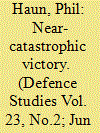

|
|
|
|
|
| Summary/Abstract |
The Israeli’s lightning quick victory of June 1967, in the Six Day War, obscured serious deficiencies in Israel’s military strategy. The Israeli Air Force’s (IAF) dependence on a preemptive strike had cost Israel an essential ally and military arms supplier in France. The false assumption that political support would again be forthcoming for a pre-emptive strike was exposed six years later, in the Yom Kippur War. The U.S. military would take lessons from the Yom Kippur War on the lethality of modern battle but observations of the changing character of modern warfare were available in the Six-Day War.
|
|
|
|
|
|
|
|
|
|
|
|
|
|
|
|
| 7 |
ID:
189982
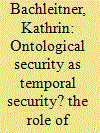

|
|
|
|
|
| Summary/Abstract |
This article explores the link between collective memory and state behaviour in international relations. In that regard, it develops a new concept entitled ‘temporal security’. Building on the existing ontological security literature, it extends a temporal understanding to its underlying identity concept. Countries are now assumed to be temporal-security seekers vis-a-vis a ‘significant historical other’ from their past. Decision makers thus enter into a self-reflective conversation with their country’s ‘collective memory’ when choosing courses of action. Contrasted with existing physical-security and ontological security explanations for state behaviour, the explanatory potential of the temporal-security approach is in a second step illustrated by the empirical case of West Germany and Austria, two former Nazi perpetrator states, and their respective assignments of support during conflict in the Middle East. Through a comparative, qualitative discourse analysis of historical documents during the Six-Day War of 1967 and the Yom Kippur War and oil crisis of 1973, the empirical study finds that West Germany and Austria adopted different courses of action in their international politics, because they looked to Nazi Germany as their significant historical other.
|
|
|
|
|
|
|
|
|
|
|
|
|
|
|
|
| 8 |
ID:
081265


|
|
|
|
|
| Publication |
2008.
|
| Summary/Abstract |
How did the Israel Defense Forces' (IDF) organisational and military culture shape their understanding of security threats, perceptions of warfare, and instinctive responses to security challenges? Israel's early military history is marked by the stubborn persistence of accepted patterns of thought and action. In the first twenty years of its existence, the IDF habitually came to sacrifice both political and military long-term and medium-term considerations in favour of the superficial, short-term satisfaction of its drive for action. The Israeli Army as an institution separated military actions from their political implications, and all too often, granted itself freedom of action at all levels of command. That myopic pattern led to recurring raids and minor operations during the 1950s, and contributed notably to the outbreak of the Six-Day War in 1967
|
|
|
|
|
|
|
|
|
|
|
|
|
|
|
|
| 9 |
ID:
073388
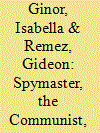

|
|
|
|
|
| Publication |
2006.
|
| Summary/Abstract |
The paper will argue that a central motive for the Soviet move was to halt and destroy Israel's nuclear development before it could attain operational atomic weapons; that this Soviet effort was accelerated by a direct message from Israel that despite its official ambiguity, it was bent on acquiring such weapons; that Soviet nuclear weapons were readied for use against Israel in case it already possessed, and tried to use, any nuclear device; and that the direct Soviet military intervention actually began with overflights of Israel's main nuclear facility by Soviet aircraft and pilots, in preparation for the planned attack on this target and/or in order to create such concern in Israel that would ensure its launch of a first strike.
|
|
|
|
|
|
|
|
|
|
|
|
|
|
|
|
| 10 |
ID:
069219


|
|
|
|
|
|
|
|